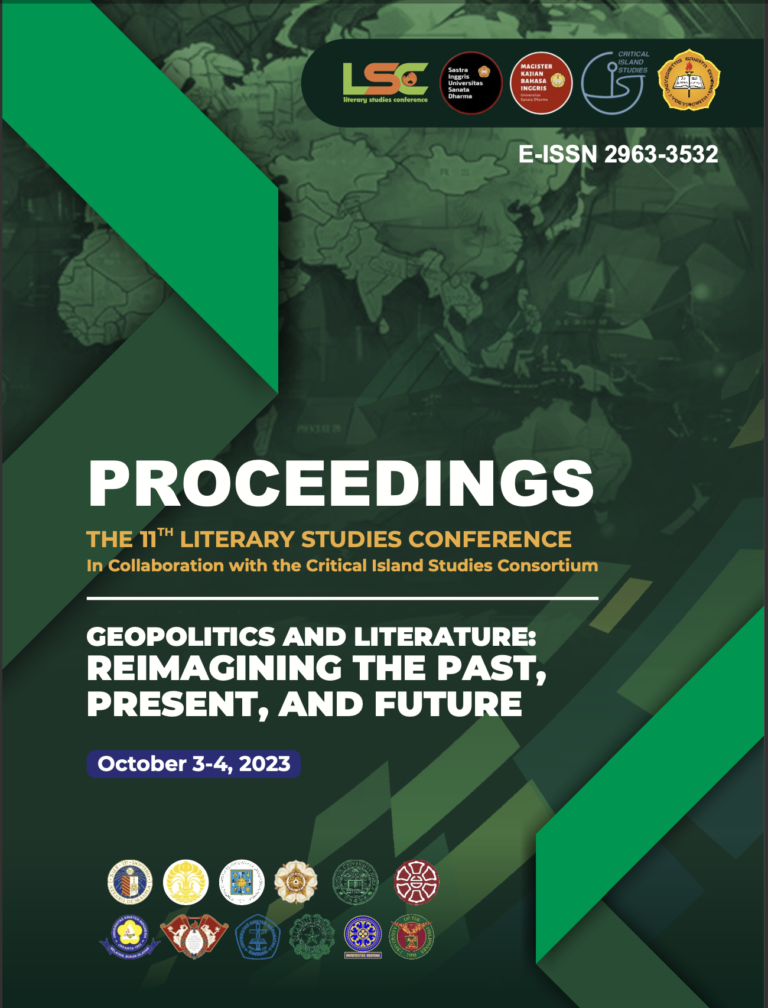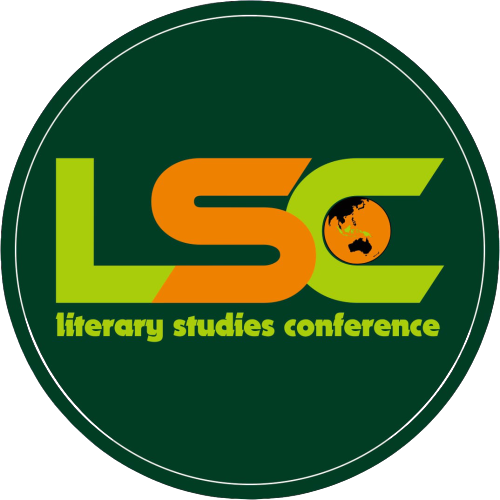LSC from Time to Time
11.
LSC 2023
Geopolitics and Literature: Reimagining the Past, Present, and Future
“LSC 11 seeks to critically examine the interplay between literature and geopolitics, encapsulated in its thematic focus, “Literature and Geopolitics: Reimagining the Past, Present, and Future”. This theme highlights how global issues and challenges are reshaping global geopolitics and calls for exploration of their impacts on language, literature, and culture.
We believe that this conference will serve as a fertile ground for participants to disseminate their insights, viewpoints, and scholarly point of view, thereby fostering a deeper understanding of the geopolitical shifts and their ramifications within the realm of literary studies. Furthermore, we anticipate that LSC 11 will accelerate potential scholarly collaborations, forge friendships, and facilitate the acquisition of enriching experiences for all attendees.“
C. Brameswari, M.Hum. & Diksita G.N., M.Hum. (LSC 11 Chairs)

10.
LSC 2022
Critical Envisioning of Literature, Catastrophe, and Its (Un)equal Interplay
“The 10th Literary Studies Conference with the theme of “Critical Envisioning of Literature, Catastrophe, and Its (Un)Equal Interplay” wishes to provide a platform for academics and researchers to share their perspectives on how catastrophes are portrayed in literature and other discourses, as well as in education, history, religion, and philosophy. Hopefully, this academic conversation enlightens us, broadens our horizons, sharpens our sensitivity, and in some ways inspires us to contribute more meaningfully to our communities.”
Elisabeth Oseanita Pukan, S.S., M.A. (LSC 10 Chair)

09.
LSC 2021
Literature and Interdisciplinarity
“Healing the broken world can be done by producing new cross-disciplinary integrative knowledge and integrating different perspectives and methods. Collaboration and persistent cooperation shown by all great presenters and participants of the 9th LSC has made the effort closer to both society in general and academia. It turns out that the online platform reaches wider audience.”
Wedhowerti, S.Pd., M.Hum. (LSC 9 Chair)

08.
LSC 2020
(Dis)Empowering Discourses in Literature: Portraits of the Weak and the Marginalized throughout History
“The interplay between power relations and power struggles frames the portraits of the weak and marginalised parties concerning social class, ethnicity, gender, religion, and sexual orientation. Literature and criticisms from many periods might capture and provide clues for the portraits. Therefore, the 8th Literary Studies Conference “(Dis)Empowering Discourses in Literature: Portraits of the Weak and the Marginalised throughout History” attempts to discern the substantiation of the portrayal from various topic areas.”
Simon Arsa Manggala, S.S., M.Hum. (LSC 8 Chair)

07.
LSC 2019
Rethinking Environmental Issues through Literature, Language, Culture, and Education
“Ecocriticism is initially a study to see the relationship between literature and the environment. To some extent, ecocriticism, which first emerged during the environmental movement in 1980s with the publication of Carson’ Silent Spring, has become, as Glotfelty (1996) puts it, “an earth-centered approach” which believes that “human culture is connected to the physical world, affecting it and affected by it”. The environmental crisis we are now facing is by all means a crisis of consciousness, a challenge to our generation as we are now perceiving that our environment is, slowly but surely, degrading and depraving, affecting our life and all living beings on planet Earth. Our generation has inevitably been given a mammoth task of halting the destruction, and eventually reversing the damage”
Link: LSC 2019 News
Harris Hermansyah Setiajid, M.Hum. (LSC 7 Chair)

06.
LSC 2018
Re-Imagining Difference and Extremism: Regional and Global Perspectives
“The postmodernists, such as Francois Lyotard and Jean Baudrillard refuse the re-establishment the modernist project since for them this is merely another grand narrative that has been proven to be potentially oppressive and intolerant to difference. Accused by Habermas as renegades of modernism, Lyotard contends that fragmentation and difference are to be accepted as liberating phenomena. He argues that there is no need to find certainty and unity of narrative since what is at stake is not what to see but how to see it. The reality is not accessible anymore since sign has reached a stage where, according to Baudrillard, it hides the fact that it does not have any connection with reality anymore. Postmodernist outlook, unfortunately, tends to lead to a world without depth – a world of simulacra. Difference and extremism are seen simulation without reality – an argument hard to sustain, especially by those victimized by their causal relationship.”
Paulus Sarwoto, Ph.D. (LSC 6 Chair)

05.
LSC 2017
Textual Mobilities: Diaspora, Migration, Transnationalism and Multiculturalism
“Diaspora and its complexities are not only theoretical debates but also living realities with its practice and continuity that have been continuously in motion for its pull and push reasons throughout human civilization from ancient to modern times. Literature and other artistic forms have captured this phenomenon and expressed its experience and dynamics in various genres and renditions in diverse texts and contexts.
Prolificacy and the spread of Jewish Diaspora texts across the globe and Ramayana tradition in Asia are few examples of the continuing tradition of Diaspora writings and its disseminations from time to time. Today‘s writers from diverse backgrounds across the continents continue writings their diaspora experiences in varied themes of displacement, alienation, adaptation, liminality, and belongings in their various works.”
Theresia Enny Anggrainy, M.A., Ph.D. (LSC 5 Chair)

04.
LSC 2016
Children’s Literature in Southeast Asia
“The 4th Literary Studies Conference (LSC), brings children’s literature as the focus to discuss. Like the previous conferences, we regionally pay attention to Asia, more specific to Southeast Asia, since it aims to build network among universities and scholars in the region as well. In fact this topic leads all of us into the awareness and reflection that the role and the position of children in our civilization are absolutely significant. The era of children is critical due to the future our civilization; therefore, to provide a special arena for them means that we prove our big concern for the future of our own lives. Certainly, by this perspective we do not split the two different worlds and create a distinctive gap between the children world and the mature-people world. The paradigm is that the children world is an important step to define the next world which identifies the qualities of human civilization in the next decade. Now the time is here, and we all are invited to contribute to our bright future since it is in our own hands.”
Dr. Gabriel Fajar Sasmita Aji, M.Hum. (LSC 4 Chair)

03.
LSC 2015
The 1965 Coup in Indonesia: Questions of Representations 50 Years Later
“Without neglecting the main focus of Literary Studies Conference which is to focus on the Asian Literature, the selected theme of the conference is “The 1965 Coup in Indonesia: Questions of Representation 50 Years Later.” The theme is selected to commemorate a painful event that occurred in Indonesia 50 years ago. Another reason is because similar experience also occurred in other countries in South East Asia. It is expected that this conference can give us a chance to see and to question the coup from literary and linguistic perspectives, and to share our ideas so that we can better understand and make sense of what happened 50 years ago.”
Anna Fitriati, S.Pd., M.Hum. (LSC 3 Chair)

02.
LSC 2014
De/Reconstructing Southeast Asian History through Literature
“Literature and history are two things that are closely intertwined. Some examples of literary works illustrate the connection between the two. The examples are Homer’s Odyssey and a historical novel by Hilary Mantel, Wofl Hall. Another example is Norwegian Wood by Haruki Murakami. Those works support the opinion that history plays an important role in shaping literature. Meanwhile, through literature we can analyze the political, cultural, or even philosophical movements that occurred in a society or culture at a particular time. To illustrate, Ronggeng Dukuh Paruk by Ahmad Tohari is a kind of imaginative writing of the situation faced by Indonesian society in the 1960s. It also reflects the political condition in Indonesia at that time.”
Anna Fitriati, S.Pd., M.Hum. (English Letters Department Chair 2014)


